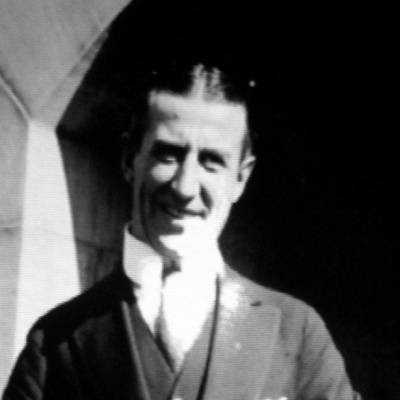
Nicky Arnstein
Childhood
Julius Wilford "Nicky" Arnstein was born on July 1, 1879, in Berlin, German Empire. His father, Moses Arndstein, was a German Jew who served in the Franco-Prussian War, while his mother, Thekla van Shaw, was Dutch. Despite his Jewish heritage, Arnstein was raised in the Episcopal Church.
The Arndstein family immigrated to the United States, settling in New Jersey, where Nicky grew up with his older brother Louis (born 1877) and younger sister Gesina (born 1883). As a teenager in the 1890s, he participated in professional bicycle races, riding a bicycle with nickel-plated spokes, which earned him the nickname "nickel plate," later shortened to "Nicky."
His introduction to the gambling world came through these bicycle races, where he became acquainted with gamblers. Interestingly, young Arnstein found more pleasure in throwing races than winning them, signaling his early inclination toward deception and gambling.
Career
Nicky Arnstein built a reputation as a professional gambler and confidence trickster in the early 20th century. His gambling activities included:
Card gambling on transatlantic liners
Betting in European casinos, particularly in London, Paris, and Monte Carlo
Working with notorious gambler and racketeer Arnold Rothstein, who was infamous for fixing the 1919 World Series
Arnstein's career was frequently interrupted by legal troubles. Between 1909 and 1912, he was arrested multiple times for various cons across Europe, though he managed to avoid conviction in many cases. In 1915, his luck ran out when he was convicted for his role in a wiretapping swindle as part of the Gondorff gang, resulting in a three-year sentence at Sing Sing prison, of which he served two years before receiving a pardon.
His most significant criminal conviction came in 1924 when he was found guilty of conspiracy to sell $5 million worth of stolen securities. This led to his imprisonment at Leavenworth, where he remained for almost two years.
Personal life
Nicky Arnstein's personal life was as colorful as his professional endeavors. He was married three times:
Carrie Greenthal (m. 1906-1918) - Arnstein abandoned her after three years of marriage.
Fanny Brice (m. 1918-1927) - His most famous marriage was to renowned entertainer Fanny Brice. They met in Philadelphia in 1912 while she performed in "The Whirl of Society." Despite knowing about his criminal background, Brice fell in love with Arnstein, and he soon moved in with her and her mother in New York City. Their relationship was tumultuous, with Brice remaining loyal to him even during his incarceration at Sing Sing, visiting him weekly. They had two children:
Frances Arnstein Stark (1919-1992)
William Arnstein (1921-2008), who later became a graphic artist known professionally as William Brice
The marriage ended in 1927 when Brice divorced Arnstein on the grounds of infidelity.
Isabelle McCullough (m. 1930) - Arnstein's third wife was a wealthy woman with a fortune of $2 million. They met in 1927 through her husband, Chicago promoter Charles McCullough. The couple lived luxuriously at Sutton Place in New York City before eventually moving to California, where they resided in a mansion in Pasadena.
Interesting facts
Arnstein used multiple aliases throughout his life, including Julius Arnold, Jules Arndtsteyn, Nick Arnold, Nicholas Arnold, Wallace Ames, John Adams, and J. Willard Adair.
His nickname "Nicky" derived from "nickel plate," referring to the nickel-plated spokes on his bicycle during his racing days. In 1939, 20th Century Fox released "Rose of Washington Square," a film musical loosely based on the lives of Fanny Brice and Nicky Arnstein. Arnstein sued the studio for $400,000, claiming defamation of character, as the character based on him (portrayed by Tyrone Power) depicted him as "a coward, weakling, confidence man, swindler to say nothing of a faithless, deceitful husband." The lawsuit was settled out of court for a reported $20,000-$25,000.
Arnstein's relationship with Fanny Brice was immortalized in the stage musical "Funny Girl," which opened on Broadway in 1964 with Sydney Chaplin playing Arnstein. The musical took significant creative liberties with his story. In 1968, Omar Sharif portrayed him in the film adaptation starring Barbra Streisand, and later in its 1975 sequel "Funny Lady."
Legacy
Though Nicky Arnstein's legacy is primarily connected to his notorious gambling activities and his marriage to Fanny Brice, he represents a fascinating figure in the history of professional gambling and confidence schemes in the early 20th century. His life story provides a glimpse into the gambling underworld of that era, including its connections to organized crime and high society.
His portrayal in popular culture has cemented his place in American entertainment history, albeit in a somewhat fictionalized form. The romanticized depiction of his relationship with Fanny Brice in "Funny Girl" has given him a posthumous fame that likely exceeds the notoriety he experienced during his lifetime.
Frequently asked Questions
Nicky Arnstein, born Julius Wilford Arndstein, was an American professional gambler and con artist active in the early 20th century. He is perhaps best known for being the second husband of famous entertainer Fanny Brice and for his various run-ins with the law related to gambling and confidence schemes.
Arnstein was introduced to gambling through professional bicycle racing in the 1890s. As a teenager, he rode bikes with nickel-plated spokes, earning him the nickname "nickel plate" (later shortened to "Nicky"). The racing circuit brought him into contact with gamblers, and he reportedly enjoyed throwing races more than winning them, marking his early involvement in the gambling world.
Arnstein was arrested multiple times between 1909 and 1912 for various cons in European cities but avoided conviction. In 1915, he was convicted for his involvement in a wiretapping swindle with the Gondorff gang and served two years of a three-year sentence at Sing Sing. His most significant conviction came in 1924 when he was found guilty of conspiracy to sell $5 million worth of stolen securities, resulting in nearly two years of imprisonment at Leavenworth.
Arnstein met Fanny Brice in Philadelphia in 1912 while she was performing in "The Whirl of Society." Despite knowing about his questionable background, Brice fell in love with him, and he soon moved in with her and her mother in New York City. They married in 1918 after his first wife divorced him and remained together until 1927 when Brice divorced him for infidelity.
Both the musical "Funny Girl" and the film "Rose of Washington Square" took significant creative liberties with Arnstein's life story. The 1939 film "Rose of Washington Square" portrayed him in such a negative light that Arnstein sued 20th Century Fox for defamation of character and received an out-of-court settlement. "Funny Girl" simplified his criminal history and romanticized his relationship with Brice, omitting his prior marriage and altering details of his criminal activities.
















